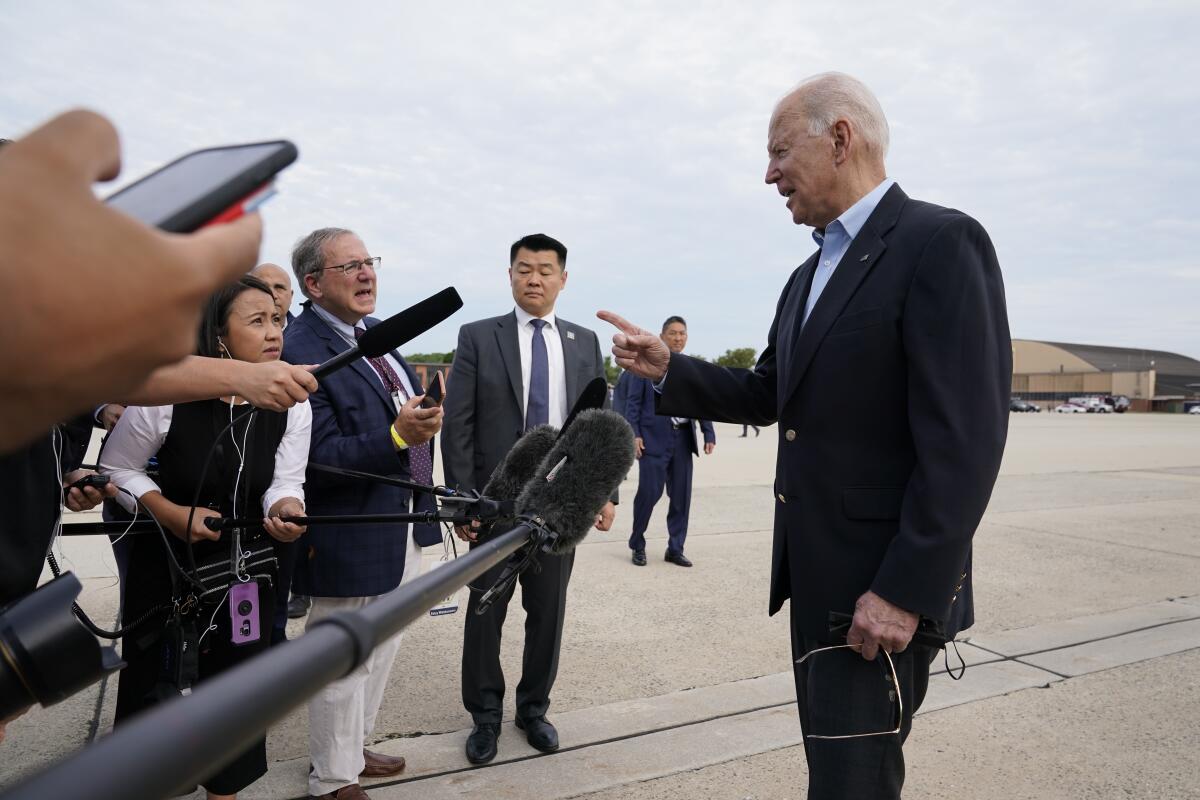One set of infrastructure talks failed. What’s next as Biden seeks a bipartisan plan?

- Share via
WASHINGTON — President Biden could be facing a make-or-break moment at home in his push for an expensive infrastructure proposal while he’s traveling in Europe this week on his first overseas diplomatic trip since taking office.
One set of negotiations with Republicans broke down shortly before he left, and now the White House is exploring other options for reaching a bipartisan deal.
“The fact is, this train is moving on several tracks,” White House Press Secretary Jen Psaki told reporters.
Keeping track of all the moving pieces can be overwhelming, so here’s a look at where things stand now and how they got to this point.
The opening offer
Biden’s original blueprint, called the American Jobs Plan, was for $2.25 trillion for roads, bridges, broadband internet access, water systems, electric car charging stations and more. He wanted to finance the new spending by partially reversing corporate tax cuts enacted under former President Trump, raising the rate to 28% after Republicans slashed it from 35% to 21%.
The White House sees political upside in seeking a bipartisan deal, especially after Democrats pushed through a $1.9-trillion COVID-19 relief plan on a party-line vote earlier this year. Although agreements between the parties have been rare, Biden has been engaged in protracted negotiations with Republicans despite concern from progressives, who worry he’s wasting his time or risks compromising too much.
Capito’s way
Until Tuesday, the White House’s primary focus had been on negotiations with Sen. Shelley Moore Capito (R-W.Va.). However, Capito ultimately agreed to only $330 billion in new spending — the rest of the money in her proposal had been repurposed from other areas of the budget. Biden said he was willing to come down from his original proposal, but wanted at least $1 trillion in spending beyond what is projected under existing programs.
There was also no agreement on how to pay for the plan, especially with Republicans refusing to revisit corporate tax cuts.
Psaki said Biden told Capito “that the latest offer from her group did not, in his view, meet the essential needs of our country.”
The senator said that “after negotiating in good faith and making significant progress to move closer to what the president wanted, I am disappointed by his decision.”
G20
The White House still sees potential for a deal with Republicans, and Biden has shifted his attention elsewhere. On the same day he broke off negotiations with Capito, he called a few other centrist senators — Sens. Bill Cassidy (R-La.), Joe Manchin (D-W.Va.) and Kyrsten Sinema (D-Ariz.) — and “urged them to continue their work with other Democrats and Republicans to develop a bipartisan proposal.”
The senators are part of a bipartisan group known as the G20, including Republican Sens. Rob Portman of Ohio and Mitt Romney of Utah, who have been trying to hammer out their own proposal.
“Any infrastructure package should and must be bipartisan,” Cassidy tweeted.
Right now the price tag on that proposal stands at roughly $900 billion, and Biden plans to be in touch while he’s traveling in Europe this week and next. It is not yet clear whether an agreement among this group would have the blessing of Senate leaders of either party, let alone enough rank-and-file members.
Get our L.A. Times Politics newsletter
The latest news, analysis and insights from our politics team.
You may occasionally receive promotional content from the Los Angeles Times.
The Problem Solvers Caucus
If a deal is reached in the Senate, it will still need to be passed in the House, and a bipartisan group in the lower chamber is already working on its own proposal. That group, known as the Problem Solvers Caucus, unveiled a proposal with nearly $762 billion in new spending.
It’s unclear whether this idea will gain traction, particularly with House Speaker Nancy Pelosi (D-San Francisco), who has final say on what reaches the floor for a vote.
Reconciliation
Since negotiations with Republicans have been bogged down, some Democrats are urging Biden to push forward with a party-line vote using the budget reconciliation process. That set of rules allows the Senate to pass budget-related legislation with a simple majority, rather than the 60 votes needed to avoid a potential filibuster.
“Every day that is wasted trying to get Republicans on board is another day that people can’t go back to work because they don’t have child care; another day without investing in millions of good, union jobs, another day that we lose further ground on the climate crisis,” said Rep. Pramila Jayapal (D-Wash.), chairperson of the Congressional Progressive Caucus. “Further delays jeopardize momentum and allow Republicans to block progress for the American people with no end in sight.”
However, Biden doesn’t seem ready to give up yet. And there’s no guarantee that reconciliation would work.
For starters, it would require total unanimity among Democrats in the Senate, who have the bare minimum 50 votes needed for the maneuver, and key figures like Manchin don’t want to take that step. And if Democrats placate him and other moderates, they risk losing support from progressives, who are demanding stronger action on issues such as climate change.
More to Read
Get the L.A. Times Politics newsletter
Deeply reported insights into legislation, politics and policy from Sacramento, Washington and beyond. In your inbox twice per week.
You may occasionally receive promotional content from the Los Angeles Times.











